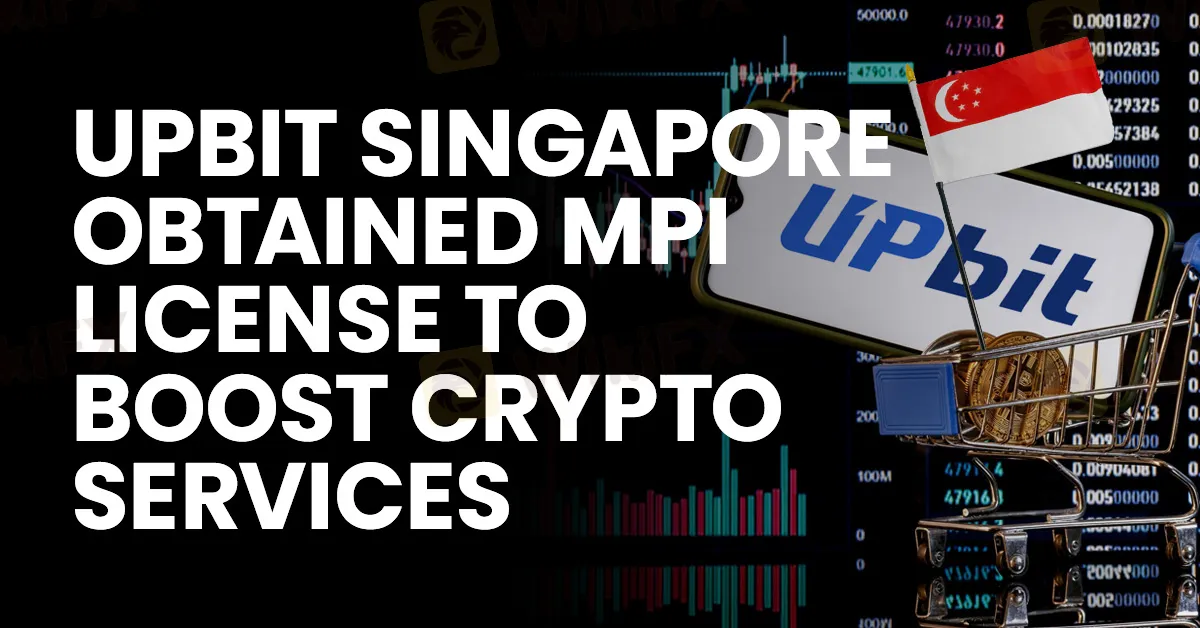简体中文
繁體中文
English
Pусский
日本語
ภาษาไทย
Tiếng Việt
Bahasa Indonesia
Español
हिन्दी
Filippiiniläinen
Français
Deutsch
Português
Türkçe
한국어
العربية
Upbit Singapore Obtained MPI License to Boost Crypto Services
Abstract:Upbit Singapore obtains a Major Payment Institution (MPI) license from the Monetary Authority of Singapore.

The Monetary Authority of Singapore (MAS) has officially granted Upbit Singapore a Major Payment Institution (MPI) license, signalling a significant stride for the company's commitment to Singapore's crypto regulations.
Alex Kim, Founder and CEO of Upbit Singapore, emphasized Singapore's emergence as a global digital asset innovation hub, stating the country's pivotal role for institutional businesses. He highlighted Upbit Singapore's poised position as the hub for institutional activities, leveraging Singapore's robust regulatory framework and its standing as a leading financial centre in Asia.
It was said that the license represents a crucial milestone for Upbit Singapore, enabling the provision of advanced digital asset solutions to both institutional and retail clients, thereby contributing significantly to Singapore's thriving digital ecosystem.
This accomplishment situates Upbit Singapore, a subsidiary of Upbit APAC, under the global digital asset group's oversight, managing regulated digital asset exchanges across Singapore, Indonesia, and Thailand.

Obtaining the MPI license from MAS represents a regulatory triumph for Upbit Singapore, facilitating the integration of digital assets within the institutional finance landscape.
In an earlier development in October, Upbit received an In-Principal Approval for an MPI license from MAS, signifying a substantial leap towards providing regulated digital payment token services.
The collaborative efforts among Singapore's government, financial institutions, businesses, and the public have solidified its position as a crypto innovation hub, akin to Switzerland and the UAE.
The pursuit of MPI licenses in Singapore extends beyond Upbit. Ripple, Coinbase, and Sygnum securing these licenses highlight the country's allure to crypto firms seeking regulated expansion. Prominent entities such as Payoneer, Blockchain.com, and TerraPay further accentuate Singapore's appeal for cryptocurrency businesses, underscoring its pivotal role in shaping the global crypto landscape.
Recently, MAS introduced new regulations to curb speculation and safeguard crypto users. The regulator unveiled stringent guidelines for Digital Payment Token (DPT) service providers in the country.
These regulations, set to be enforced from mid-2024, aim to transform how crypto entities operate in Singapore. The MAS demands a fundamental shift in how DPT service providers conduct their business, emphasizing accountability and risk mitigation as critical aspects.

Disclaimer:
The views in this article only represent the author's personal views, and do not constitute investment advice on this platform. This platform does not guarantee the accuracy, completeness and timeliness of the information in the article, and will not be liable for any loss caused by the use of or reliance on the information in the article.
Read more

Gigamax Scam: Tracking Key Suspects in RM7 Million Crypto Fraud
Malaysian authorities are actively pursuing seven individuals linked to the Gigamax investment scam, which has defrauded investors of over RM7 million. The suspects include an Indonesian national, identified as Awaludin, who is believed to be the mastermind behind the scheme, and six Malaysians who served as promoters and speakers for the fraudulent operation.

Singaporean Arrested in Thailand for 22.4 Million Baht Crypto Scam
Thai authorities have apprehended a 32-year-old Singaporean man suspected of being part of a transnational syndicate involved in cryptocurrency scams. The group is accused of defrauding victims of more than 22.4 million baht (S$886,000) through a fraudulent trading platform.

Kraken and BitGo to Handle FTX Payouts Starting January 2025
Kraken and BitGo will oversee the first FTX payouts starting January 3, 2025. 98% of creditors receive at least 118% of their claims in cash.

FCA Seeks Input to Shape UK Crypto Market Regulations
UK FCA seeks public feedback on crypto rules to improve market transparency, protect consumers, and support growth. Comments are open until March 2025.
WikiFX Broker
Latest News
Volkswagen agrees deal to avoid Germany plant closures
Geopolitical Events: What They Are & Their Impact?
Top 10 Trading Indicators Every Forex Trader Should Know
TradingView Launches Liquidity Analysis Tool DEX Screener
MultiBank Group Wins Big at Traders Fair Hong Kong 2024
WikiEXPO Global Expert Interview: Simone Martin—— Exploring Financial Regulation Change
'Young investors make investment decisions impulsively to keep up with current trends' FCA Reveals
Why Do You Feel Scared During Trade Execution?
CySEC Settles Compliance Case with Fxview Operator Charlgate Ltd
Scope Markets Review: Trustworthy or Risky?
Currency Calculator


